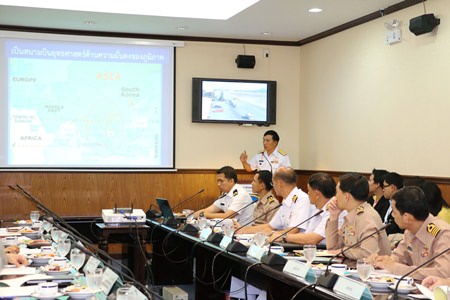The Transport Ministry’s top bureaucrat visited U-Tapao-Pattaya International Airport, meeting with top navy officers to discuss the airport’s future.
Airport chief Adm. Pijarn Theeranaet met Dec. 9 with ministry Permanent Secretary Soithip Traisuth.
Adm. Vasinsan Janthavarin told reporters that U-Tapao’s main income comes from fees from commercial airlines and charters using the military-run Rayong facility.
Plans have been in the works since 2011 to upgrade the airport to a large, public international airport but the Royal Thai Navy – which regards the airport as its flagship asset – has dragged its feet claiming it still is home to the First Air Wing and civil use would pose a military-security risk.
 Officials meet at U-Tapao-Pattaya International Airport to discuss the airport’s future.
Officials meet at U-Tapao-Pattaya International Airport to discuss the airport’s future.
The junta, however, in August ordered the Navy to develop a blueprint to make U-Tapao the key to the Eastern Seaboard’s transportation network and jumpstart the stalled expansion of the airport’s terminal, which remains a large hole in the ground.
Currently U-Tapao offers only scattered Russian charter flights and limited Phuket and Koh Samui service from Bangkok Airways. Vasinsan said numerous international airlines are interested in beginning service there. Thai Airways International and Orient Thai Airlines also are known to be interested, should U-Tapao be expanded.
Royal Thai Navy officials in 2011 approved a 868 million baht budget to transform the military air field in Rayong into a modern civilian airport. The expansion called for not only a new terminal capable of handling 1,500 passengers per hour, but new parking facilities, fuel depot, fire-fighting systems, x-ray machines and improvements to other equipment and landscaping.
Nearly four years later, only the fuel, fire and x-ray equipment has been purchased, along with a new radar system and improvements to a warehouse. Work in the 25,200 sq. meter terminal halted after the foundation was laid. Not even a single wall has been erected.
Budgeted for 468 million baht, work on the terminal was supposed to have been finished in June 2013. But the project’s original contractor first said it could not deliver the terminal on time, then insisted the budget was too small to do the job at all. The contractor was fired and work stopped while the project was put out for bid again.
The Seri Karnyotha Co. won the new bid at 619.2 million baht. Officials said plans for the building also changed, with the terminal said to be larger so it can be a true alternative to Bangkok’s Suvarnabhumi International Airport. No dimensions for the revised terminal were released.
That work stopped after May’s military coup.




